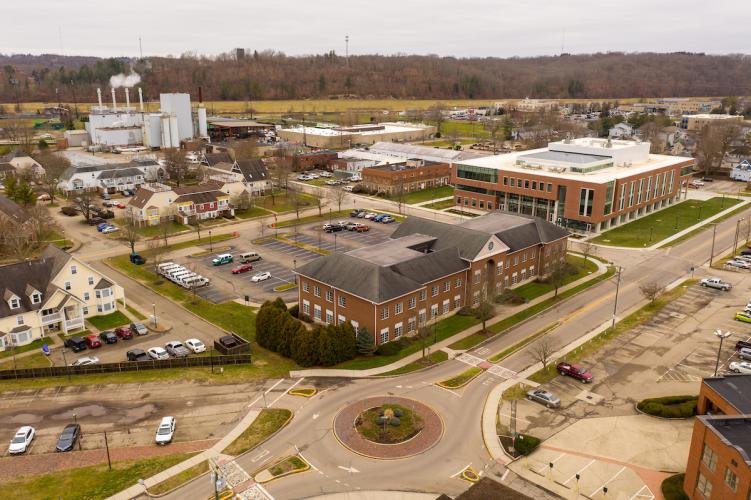
Ohio University’s Heritage College to bring researchers together through new Translational Research Facility

Ohio University’s Heritage College of Osteopathic Medicine will start work on a new facility on the Athens campus dedicated to translational research. The Translational Research Facility will support clinical and translational research by offering a high quality, modern, flexible and accessible research and clinical space focused on providing access to public-facing clinical research.
The facility will promote team science by bringing like-minded research teams together in one space, while enhancing the visibility of OHIO’s research efforts to students, throughout the University, and to the community and region.
“I am beyond excited about the collaborative research that this new space will foster, from biological basis of health and disease to interventions that improve the health of individuals and the public,” Ken Johnson, D.O., executive dean of the Heritage College and chief medical affairs officer for OHIO, said. “The facility will be a necessary cornerstone of the Heritage College’s continued transformation, solidifying our position as a national leader in healthcare, medicine, education, research and service to the region.”
In addition to serving the Heritage College, the Translational Research Facility will also support several other colleges and an array of health-related institutes including the Ohio Musculoskeletal and Neurological Institute (OMNI), the Diabetes Institute, and the Infectious and Tropical Disease Institute (ITDI), all within the Heritage College, as well as the Appalachian Institute to Advance Health Equity Science (ADVANCE) in the College of Health Sciences and Professions (CHSP). Faculty and students who work within the institutes encompass almost every college at OHIO.
The facility, which will be located on Union Green amid other state-of-the-art facilities such as Heritage Hall and the new Russ Research Center, will also include the Heritage College Community Health Programs (CHP) which has provided services to not only the Athens County community but also to 24 counties across Ohio.
The Translational Research Facility will provide space for human subject research and basic science research and include consultation and exam rooms along with a wet lab and animal care facility. It will also house OHIO’s Clinical and Translational Research Unit (CTRU), the administrative offices of several institutes and the Heritage College’s Office of Research and Grants and have community health space that includes a pharmacy. The new research facility will be adjacent to the Medical Education Center, which was previously occupied by OHIO’s human resources and training center.
The vision for a building to support the Heritage College’s clinical research efforts began back in 2011 with a transformational $105 million gift from the Osteopathic Heritage Foundation (OHF). Part of that gift included $38 million for collaborative research, $16.2 million of which is being allocated specifically for the new research facility.
“The Osteopathic Heritage Foundation recognizes the role scientific discovery and innovation play in advancing patient care and delivery; and we are proud of Dr. Johnson and the Heritage College team for their work over the past 10 years in building the research enterprise and preparing for this much needed translational research facility,” Terri Donlin Huesman, president and CEO of OHF, said. “The Foundation is proud of its long-standing partnership with Ohio University and the Heritage College, and this facility is an important step in solidifying the Heritage College’s position as Ohio’s largest public medical school and a national leader in scientific discovery, medical education, community outreach and patient care and delivery.”
Since the gift in 2011, the research portfolio of the Heritage College grew exponentially; the Clinical and Translational Research Unit was created, and the Diabetes Institute was formed to consolidate diabetes-related initiatives around the university. Due to the overlapping needs of these entities, the planning transitioned from the original plan of building multiple buildings to support individual needs to a single building to support the collective clinical and translational research portfolio within and outside the Heritage College. More recently, the Heritage College’s Community Health Programs were also slated to be housed in this building due to the synergy in space and function, as well as to enhance service to the community and region.
“The Translational Research Facility will play an important role in the Heritage College because as a medical school engaged in research activities that inform and aim to transform patient care and population health, this facility will allow for the college to be more impactful and promote team science, maximizing the opportunities for collaborative efforts,” Darlene Berryman, Ph.D., associate dean for research and innovation and professor of biomedical sciences, said.
Currently, the college’s research activities are fragmented and spread across many buildings, not publicly accessible, and in spaces not designed or best suited for clinical research.
“Research is part of the foundational skills medical students should learn to prepare them to be practicing physicians, so making research visible and accessible to medical students, as well as other students across the university will be key to our success in research and in training our students,” Berryman added.
The Translational Research Facility was approved by the Ohio University Board of Trustees at their Oct. 21 meeting. The design process will begin in early 2023, with plans for construction to start in mid-2024, and an opening date near the end of 2025.
